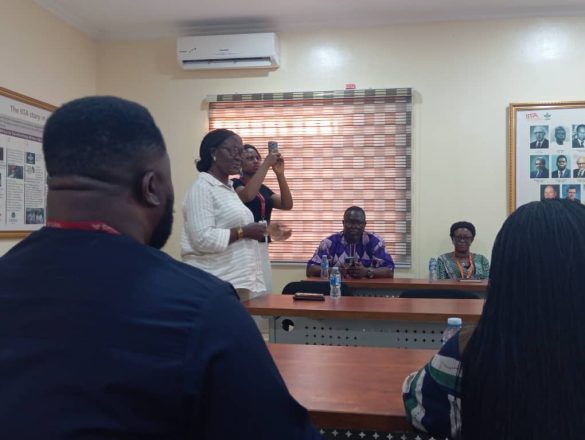The International Institute of Tropical Agriculture (IITA) has reaffirmed its commitment to combating aflatoxin contamination in Nigeria’s food crops a persistent threat to public health, agricultural exports, and farmers’ livelihoods.
Speaking during a field trip to IITA’s Abuja Station in Kubwa, organized by the Global Alliance for Improved Nutrition (GAIN) in partnership with Nigeria Health Watch, Dr. Beatrice Aighewi, IITA Abuja Station Representative and Seed System Specialist, said the institute’s groundbreaking research is drastically reducing aflatoxin levels in grains and tuber crops such as maize, groundnut, cassava, and yam.
“Aflatoxin affects most grains maize, groundnut, and even tubers like cassava and yam when they are not properly dried,” Dr. Aighewi explained. “Our research developed a natural control method using beneficial fungi found in the soil to outgrow and suppress the toxic ones. This approach has achieved about 98 to 99 percent cleanup of infected fields.”
She explained that the bio-control product, developed by IITA scientists, has been successfully adapted to different crops and ecological zones across Africa. “The strain used in Nigeria is not the same as what you’ll find in East Africa,” she said. “We tailor the technology to local conditions, using indigenous organisms that are both environmentally safe and highly effective.”
Dr. Aighewi stressed that IITA, as a non-profit research institute, focuses on developing and sharing innovations rather than commercializing them. “We built a prototype factory to demonstrate how aflatoxin-control products can be produced locally, and several countries, including Liberia, have now established similar facilities,” she noted. “These efforts are restoring confidence among food processors and exporters who previously suffered international rejections due to contamination.”
Highlighting IITA’s broader impact on agricultural productivity, Dr. Aighewi disclosed that Nigeria’s cassava and yam farmers have recorded remarkable yield increases using IITA-improved varieties.
“While most farmers used to harvest 8 to 10 tons per hectare, those planting IITA-improved varieties now achieve between 30 and 40 tons,” she revealed. “The difference is clear healthier leaves, higher productivity, and safer food.”
She called on government agencies, private sector actors, and farmers to adopt IITA’s research-based innovations to strengthen Nigeria’s food safety framework and enhance its competitiveness in the global agricultural market.
“Once aflatoxin is found in food products, they are rejected in international trade,” Dr. Aighewi warned. “We must prioritize food safety from the farm level to protect both consumers and our economy.”
In his opening remarks, Mr. Victor Ekeleme, Senior Associate, Communications at GAIN, underscored the importance of collaboration and knowledge exchange in strengthening Nigeria’s food systems. He said the visit provided participants with valuable insights into IITA’s contributions to agricultural innovation and food system transformation across Africa.
“We’re here to learn about how IITA contributes to the food system landscape and to see some of the ongoing research that supports nutrition and food security in Nigeria,” Ekeleme stated.
Ekeleme emphasized that partnerships between research institutions, the media, and policymakers are vital to building evidence-based solutions for sustainable food systems and better nutrition outcomes for Nigerians.

